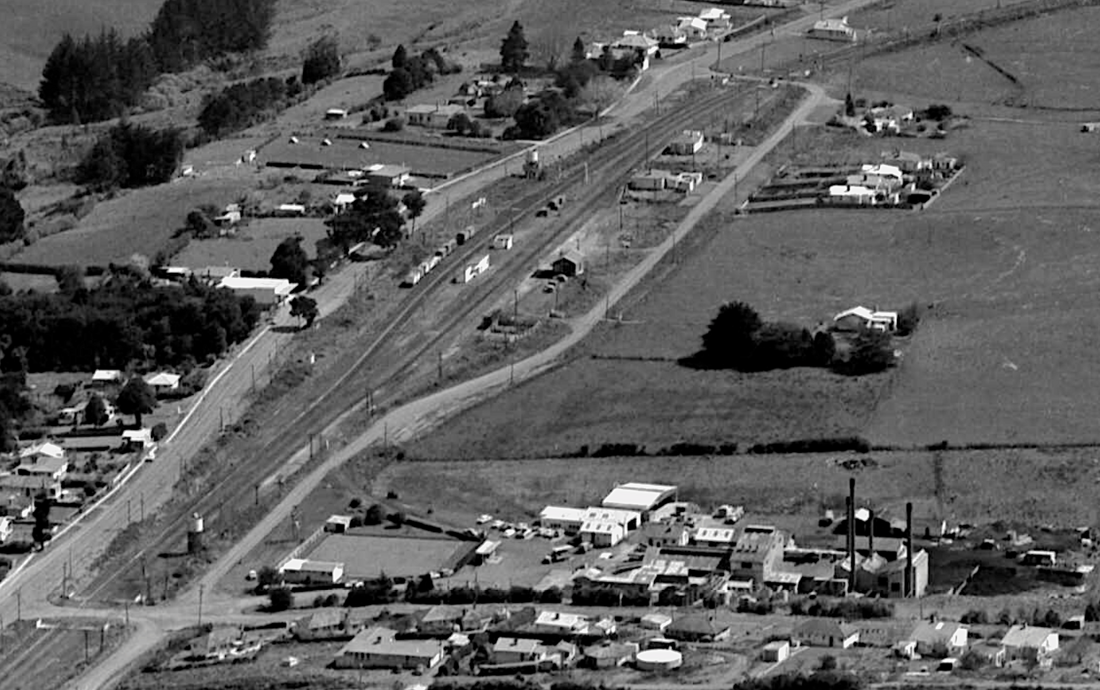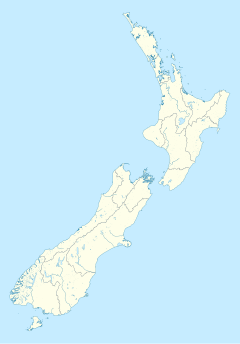Paerātā railway station
Railway station in New Zealand From Wikipedia, the free encyclopedia
Paerātā railway station is a railway station under construction in Auckland, New Zealand. It is due to open in 2026 as part of the Auckland railway electrification project. It will serve the Paerata area, linking with the new Paerata Rise housing development. The station will be located on the existing North Island Main Trunk railway line, adjacent to the planned eastern extent of the development.[2]
Paerātā | ||||||||||||||||||||||||||
|---|---|---|---|---|---|---|---|---|---|---|---|---|---|---|---|---|---|---|---|---|---|---|---|---|---|---|
| Auckland Transport Urban rail | ||||||||||||||||||||||||||
 Paerata in 1962 | ||||||||||||||||||||||||||
| General information | ||||||||||||||||||||||||||
| Location | Paerata, Auckland, New Zealand | |||||||||||||||||||||||||
| Coordinates | 37.1564°S 174.8976°E | |||||||||||||||||||||||||
| Owned by | KiwiRail (track and platforms) Auckland Transport (buildings) | |||||||||||||||||||||||||
| Operated by | Auckland One Rail | |||||||||||||||||||||||||
| Line(s) | Southern Line | |||||||||||||||||||||||||
| Platforms | Side platforms (P1 & P2) | |||||||||||||||||||||||||
| Other information | ||||||||||||||||||||||||||
| Station code | PTA | |||||||||||||||||||||||||
| Fare zone | Southern Manukau | |||||||||||||||||||||||||
| Website | KiwiRail | |||||||||||||||||||||||||
| History | ||||||||||||||||||||||||||
| Opened | 20 May 1875 original | |||||||||||||||||||||||||
| Opening | early 2026 | |||||||||||||||||||||||||
| Closed | 1 October 1982 | |||||||||||||||||||||||||
| Electrified | 25 kV AC (2024)[1] | |||||||||||||||||||||||||
| Services | ||||||||||||||||||||||||||
| ||||||||||||||||||||||||||
| ||||||||||||||||||||||||||
Between 1875 and 1972, it was a flag station, 28 mi (45 km) south of Auckland,[3] on the North Island Main Trunk in New Zealand, serving the Paerata settlement.[4][5]
The original station was opened on 20 May 1875.[6] It was closed to passengers on 24 July 1972, and to all traffic on 1 October 1982. A crossing loop was retained.[6]
In 1981, Paerata junction to the Waiuku Branch was re-designed and resignalled,[7] with a new connection towards Pukekohe.[4]
History
Summarize
Perspective
The rural community of Paerata was served by Paerata railway station from 1875 until 1972.[6] This station was located one kilometre to the south of the modern station.
The line from Ōtāhuhu reached Paerata in 1873.[8] and opened to Mercer on 20 May 1875.[9] A building was erected in 1874 for £30. By 1884, when Paerata first appeared in timetables,[10] there was a shelter shed and a passing loop for 22 wagons. By 1896, there was also a passenger platform with a cart approach and a 28 wagon loop. Sheep yards and a loading bank followed and, from 1906, a Post Office was run by station staff, which moved to Messent's store in 1923.[11] In preparation for the Waiuku Branch, the loop was extended in 1913 to 70 wagons, two cottages and a goods shed were built in 1914[7] and the station became an island platform in 1917.[12] The gradient on the Karaka bank, between Runciman and Paerata, was eased from 1 in 40 to 1 in 100 between 1914 and 1916. The work included large cuttings and embankments.[13] A cutting about 1 mi (1.6 km) north of Paerata suffered from 5 slips in the next decade.[14] One of the slips in 1916 was temporarily bypassed by relaying track on the old alignment.[15] A new passing loop was also added at Karaka,[16] 4.74 km (2.95 mi) north of Paerata.[4] Paerata became a junction station from 10 December 1917, when the first section of the Waiuku Branch opened as far as Patumahoe.[17] The initial service on the branch in 1922 was only a train each way on Tuesdays and Fridays.[18] Automatic signalling replaced token blocks in 1926.[19] In 1928, 35 wagons were derailed between Pukekohe and Paerata.[20]
Duplication of line between Papakura and Paerata was completed by 3 December 1939[7] and to Pukekohe[21] in 1941.[22] From 1923[23] until at least 1943, the dairy factory had a private siding.[7]
On 24 July 1972, Paerata closed to all traffic, except in wagon lots. The stockyards were removed and the goods shed moved to Ōtāhuhu Rail Weld Depot in 1973. In 1978, the goods shed loop was sold to Glenbrook Vintage Railway. The station closed to all traffic on 17 July 1977. By 1982, the station building had been demolished.[7]
New train stations for Drury West and Paerata are included in a July 2017 proposal for Auckland infrastructure spending of $600 million to support new housing announced by the government. They will be built and owned by a new Crown Infrastructure Partners body, as the Auckland Council has reached its borrowing limit.[24] The new station will be just east of Paerata Rise,[25] about 1 km (0.62 mi) north of the original station.[26]
As part of the New Zealand Upgrade Programme, Jacinda Ardern's government announced $371 million in funding towards the electrification of track from Papakura to Pukekohe, and a separate $247 million towards the construction of two new stations in Drury Central and Drury West. This was later expanded to include a third station at Paerata.[citation needed]
Planning consent was granted for the Drury Central and Paerata stations in February 2022, with further work being undertaken to gain approval for the Drury West station.[27]
The new stations have attracted criticism from public transport advocates, who say that they are too designed for auto-dependency.[28]
In May 2022, KiwiRail and Auckland Transport announced proposed names for the three stations, replacing the placeholder names of Paerata, Drury West, and Drury Central. These names were gifted by mana whenua, in order to restore the original te reo Māori names of the area.[29] The placeholder name of Paerata was replaced by Paeraataa, reflecting the preference of Waikato Tainui for using double vowels instead of macrons to indicate vowel length. The name derives from a conflation of 'pae', a Māori word meaning 'a ridge or resting place', and 'raataa', referring to a rātā tree.[30]
In August 2022, the New Zealand Geographic Board returned its verdict on the name, rejecting the use of double vowels as preferred by the Mana Whenua Forum, and instead recommending the name 'Paerātā', in line with national and te reo Māori orthographic standards. The iwi involved expressed strong dislike of the decision, saying that standardisation of the written form is a loss of their identity and homogenisation of culture, and that they want their children to not be penalised in schools and to learn written te reo Māori in their regional form. The public consultations on the name change ran until early November that year. The Board's recommended name was approved by the Land Information Minister Damien O'Connor in March 2023.[31][32]
See also
References
External links
Wikiwand - on
Seamless Wikipedia browsing. On steroids.


